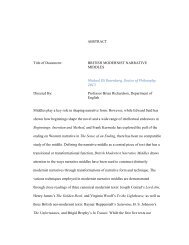PSYCHOTHERAPY ENGAGERS VERSUS NON-ENGAGERS
PSYCHOTHERAPY ENGAGERS VERSUS NON-ENGAGERS
PSYCHOTHERAPY ENGAGERS VERSUS NON-ENGAGERS
You also want an ePaper? Increase the reach of your titles
YUMPU automatically turns print PDFs into web optimized ePapers that Google loves.
ange on the OQ-45.2 when beginning therapy and made at least 14 points of change<br />
according to his/her OQ-45.2 scores, and both client and therapist agreed that the<br />
treatment goals had not been met yet, but the client and therapist experience a rupture in<br />
the therapeutic relationship and the client leaves to seek therapy elsewhere. Under the<br />
clinically significant and/or reliable change definition, this client would not be classified<br />
as a treatment dropout even though both the therapist and client would agree that the<br />
client did indeed drop out of therapy with this particular therapist. Furthermore, an<br />
additional problem with using the clinically significant change and/or reliable change<br />
method is that it does not distinguish between different sub-types of dropouts. Some<br />
studies may want to look at certain types of dropouts based on particular clinical<br />
phenomena observed. For example, intake-only dropouts may differ in important ways<br />
from later dropouts; perhaps the early dropouts were never ‘hooked in’ whereas the later<br />
dropouts experienced ruptures in the therapeutic alliance.<br />
Early dropouts, such as intake-only dropouts, may be especially important to<br />
examine not only because early dropout may result from a differing set of factors than<br />
later dropout (Barrett et al., 2008), but because clients who drop out early on in therapy<br />
(e.g., after only one or two visits) have poorer outcomes than those who drop out later in<br />
therapy (Pekarik, 1983, 1992). Thus, the present study will focus on psychotherapy<br />
dropout occurring in the early phase of therapy rather than later on in therapy.<br />
Since the focus of the present study is on psychotherapy dropout occurring after<br />
intake, the definition of dropout that will be used for the present study refers to clients<br />
who did not return for therapy after the initial intake session and have not reached their<br />
therapeutic goals as determined by therapist judgment. Similarly, in previous studies,<br />
8

















